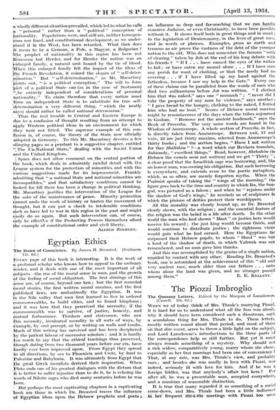Egyptian Ethics
The Dawn of Conscience. By James H. Breasted. (Seribners.
1 12s. 6d.)
EVERY page of this book is interesting. It is the work of a profound scholar who knows how to appeal to the ordinary reader, and it deals with one of the most important of all
t subjects—the rise of the moral sense in man, And the growth t
a the feeling of social obligation. The first stirrings of this ■
sense are, of course; beyond Our ken ; but the first recorded Moral stories, the first written' Moral maxims, and the first
iiiblished laws, are undoubtedly the Egyptian. It was in the Nile valley that men first learned to live in ordered commonwealths, to build cities, and to found kingdoms ; and it was here that they perceived the necessity, if the
commonwealth was to survive, of justice, honesty, •and 1 mutual forbearance. Thinkers and statesmen, who saw this necessity, inculcated morality in all sorts of ways, by i'xi:i" mple, by oral precept, or by writing on walls and tombs. Much of this writing has survived and has been deciphered by the patient labour of successive scholars ; and it is hardly too much to say that the ethical teachings thus preserved, though dating from two thousand years before our era, have hardly ever been improved upon. From Egypt they spread hi all directions, by sea to Phoenicia and Crete, by land to alestine and Babylonia. It was ultimately from Egypt that 'he great Greek moralists derived their inspiration. When lato ends one of his greatest dialogues with the dictum that it is better to suffer injustice than to do it, he is echoing the :words of Nilotic sages who died many centuries before he was born. , ' But perhaps the most captivating chapters in a captivating book are those in which Dr. Breasted traces the influence Of Egyptian ideas upon the Hebrew prophets and poeta4...1. an influence so deep, and far-reaching that we can _hardly conceive Judaism, or even Christianity, to have been possible without it. It shows itself both in great things and in small ;
in the legislation of Deuteronomy, in the lives of great men, and in words or phrases. Examples, gross as earth and
tenuous as air prove the vastness of the debt of the younger
nation to the old. Who does not remember the famous "oath . of clearing" taken. by Job at the end of his long debate with
his friends ? " . . -. have caused the eyes of the widow to fail ; or have eaten my morsel alone . . . If I have seen
any perish for want of clothing, or that the needy had no covering. . . if I have lifted up my hand against the fatherless, because I saw my help in the Gate." Every one of these claims can be paralleled from the words of men with died two millenniums before Job was written. "I clothed him that *as naked," says one nomarch " ; ". never did take the property of any man by violence," says another : "I gave bread to the hungry, clothing to the naked, I ferried him who had no boat." Scores of Hebrew moral maxims might be reminiscences of the days when the tribes sojourned in • Goshan. "Remove not the ancient landmark," says the Book of Proverbs. The very same words are found in the Wisdom of Amenemope. A whole section of Proverbs, in fact, is directly taken from Amenemope. Between xxii, 17 and xxiv, 22 are just thirty maxims, selected from Amenemope's thirty books ; and the section begins, "Have I not written for thee ShAlishim " ?—a word which our Revisers translate, dubiously, "excellent things." Read, however, Sheloshint (in Hebrew the vowels were not written) and we get " Thirty " ; a clear proof that the Israelitish sage was borrowing, and, like an honest man, was owning his obligation. But such borrowing is everywhere, and extends even to the poetic metaphors, which, as so often, are merely forgotten myths. When the Psalmist speaks of taking the "wings of the morning," the figure goes back to the time and country in which Ra, the Sun- god, was pictured as a falcon ; and when he "rejoices ant the shadow of God's wings," he reminds us of sculptures m which the pinions of deities protect their worshippers.
All this morality was closely bound up, as Dr. Breasted clearly shows, with the religion ; and the essential feature of the religion was the belief in a life after death. In the other world the man who had shown " Maat " or justice here would receive his reward ; the just king would become Osiris, and would -continue to distribute justice ; the righteous vizier would gain what he had earned. Here the Egyptians far surpassed their Hebrew pupils, to whom " Sheol " was bit a land of the shadow of death, in which _Yahweh was nat remembered, and no man gave him thanks.
And this was accomplished by the genius of a single nation, unaided by contact with any other. Reading Dr. Breasted's book, one is astonished at the achievement of this "old arid very ancient race, much older than our fathers . . . unto whom alone the land was given, and no stranger passed
















































 Previous page
Previous page